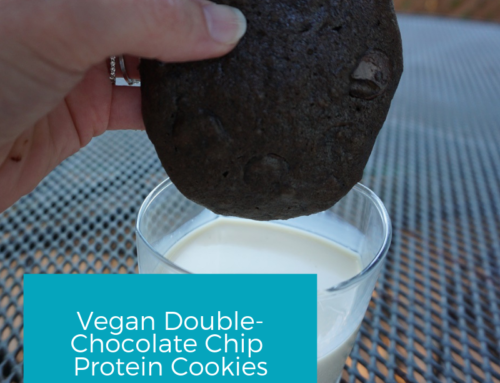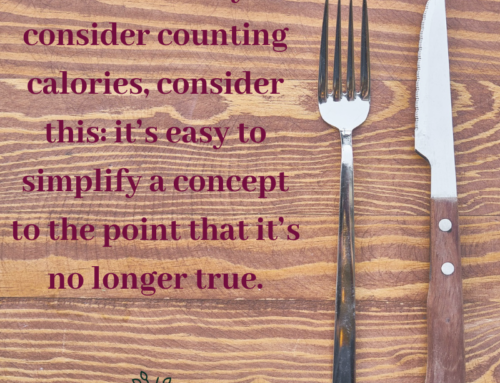Dessert and health eating often don’t go in the same sentence. Nor do many diet plans include dessert. But I believe dessert can be included in healthy eating. One aspect of my food philosophy that has developed over the past few years is that we shouldn’t avoid the foods we enjoy just because of guilt that society has placed on eating certain foods or because of certain restrictions we place on ourselves. Being highly restrictive and consistently avoiding dessert takes the fun out of eating the foods we enjoy. And putting foods on the “bad list” can make you want them even more, which can compromise your long term health goals.
Healthy Eating
It might be a little confusing because we encourage you to maximize the health benefits we get from food by choosing foods that are nutrient dense. And then we also say listen to your body and eat the foods you enjoy. And let’s be honest, those two might not match up. Foods that are healthy might not be the ones your body is telling you to eat. But many of us can probably agree we have stopped listening to our bodies. And when we do enjoy certain foods that our bodies enjoy, we may feel guilty, restrict, or abuse exercise.
So how can you enjoy eating dessert (or the foods that bring you joy) and still feel healthy and balanced? I think it is possible to eat foods we enjoy, while achieving our physique and performance goals.
Learning to Listen to Your Body
If listening to your body is a new way of eating, it can seem weird. It’s a different way of looking at food and doesn’t come instantly. I think a good place to start is look at your current dietary patterns. Take a few weeks to record what you eat, how much you eat, and the most important part of this activity is to write down how you feel before and after eating. When you start to feel hungry try rating your hunger cues on a 1-10 scale.
Ask yourself questions like “Am I really hungry? How hungry do I feel? What kind of sensations am I having right now?” Starting to recognize those early cues of hunger again like a rumble in your stomach or feeling a little light headed is key to understanding what kind of fuel you need and when you need it. Next, once you are done eating assess yourself on the scale again. Did you eat only until you were no longer hungry? Did you eat until full or when you started to feel uncomfortable? Remember, there is no right or wrong answer to this. This about your body and how food makes you feel.
There are patterns and most people feel most comfortable between a 3 and 6. Here’s a scale you can use to rate your hunger.

Trust Your Body
Once you’ve learned what it feels like when your body is telling you that you are hungry or satisfied and full, trust your body! We often look for diet protocols because we don’t trust our body to make that food decision.
Health recommendations and food recommendations are just guidelines and recommendations. They provide you with some groundwork to understand how food can impact your overall health. But a generic recommendation may or may not be right for you. No one can tell you what is right for your body. So you have to be OK with trusting what your body is telling you.
If you’re listening to your body, choosing foods that make you feel good physically, a piece of Italian Cheesecake, gelato, or an occasional order of french fries can fit into your routine. Practice trusting your body and make it OK to choose what it needs.

Italian Cheesecake and gelato from a trip to NYC
Stop with the Good and Bad Foods
I don’t believe there’s one food that is inherently bad for you, especially if it is eaten in moderation. I don’t believe in guilt-free dessert because there’s no reason to feel guilty about dessert in the first place.
When we are able to remove the idea of good and bad foods, it allows us to make a decision without bringing negative emotions into it. We can make a decision based on listening to our body. More often than not if we spend a few minutes listening to our body, and not the chatter that comes with good and bad labeling, we’re more likely to choose that foods that make our body feel good and nourished.
When I was a teenager, a small group of girls wanted to backpack into summer camp. We spent three days hiking and met up with the rest of the girls who had driven into camp. The morning we arrived into camp, our leaders had prepared bacon, eggs, and pancakes for us. I ate probably 8 or 9 pieces of bacon and drank at least 3 cups of milk. It was a moment that I had truly listened to my body without any consideration for good or bad foods and it felt so good. My body had needed that protein and fat and I had allowed myself to fuel it with what it needed. That didn’t happen often so it’s a memory that sticks with me.
Food is Fuel
The biggest reason anyone goes on a diet is because they want to make a change in their body, their performance, or reach a physical goal. I am not saying that you have to give up those things in the name of food. But I do believe that you can reach your goals without the extreme diets, removing carbohydrates, or by cutting weight.
A study from the University of Tubingen assessed 111 female university students. They measured their aptitude at Intuitive Eating. The Intuitive Eating scale for this study measured three specific aspects:
- unconditional encouragement to eat when hungry
- eat for physical cues and reasons
- reliance on internal hunger cues for when and how much to eat
To test these aspects, researchers used a heartbeat test, where the individuals identified their pulse without measuring it. Individuals who have a good interoceptive awareness are able to guess their pulse because they feel the lubdub-lubdub of their heart. This study found that those who scored highest on the heartbeat test also scored the highest on the Intuitive Eating scale and had lower BMIs.
Previous studies have connected this interoceptive awareness to higher abilities to sense hunger and fullness (Herbert et al, 2012) and individuals who suffer from anorexia have lower internal perceptions of bodily signals than healthy women (Pollatos et al, 2008).
Be Well
Being well comes from more than just a eating a plate of salad because that’s what everyone has told you will make you healthy. Overall wellness is eating in a way that makes you feel best in the moment and the moments after. When you really wanted that cookie but you go for the apple, your body might feel unsatisfied and begin to look for something else. That’s a clear sign that the apple was not your best choice for wellness.
If you start to listen to your body, you’re not going to gain weight and become unwell. It might be the opposite. A recent study found that women with higher mindfulness scores were less likely to be overweight or obese. Mindfulness is defined as non-judgmental awareness of the present moment and this study, along with other studies, show evidence that being mindful can help manage your weight.
So the next time you’re about to avoid eating your dessert, ask your body, “Do I really want this?”
If the answer is yes, eat it and enjoy it. Trust your body to choose what’s best for it. That is scary, I know. But I promise that what your body chooses when you listen to your internal cues are the foods you need to eat right now.
[Tweet “Eat dessert with no guilt! via @thehealthfulpeach”]






Leave A Comment